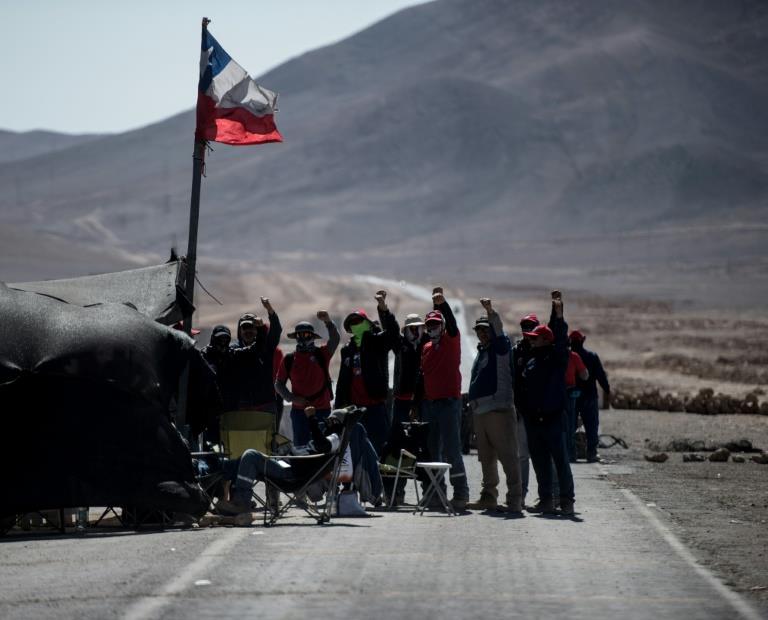
Workers strike at world's biggest copper mine in Chile
Workers at the world's largest copper mine in Chile are striking after pay talks with Australian resources giant BHP fell apart, casting a shadow of uncertainty Wednesday over the market for the commodity.
The Escondida mine in northern Chile yearly digs up around five percent of the world's copper, a coveted metal used in everything from electrical wiring to rechargeable batteries.
A global glut in copper stockpiles should blunt the immediate impact of the strike, analysts said, although there are fears it could start to bite if production is slowed for more than a week or two.
Australian-based BHP, which owns a majority stake in the vast open-air mine, said scaled-back operations would continue as non-union staff put contingency plans into action.
Production ground to a halt at the Escondida mine when workers downed tools for 44 days in 2017, costing BHP $740 million and wiping 1.3 percent off Chile's annual economic output.
Encouraged by surging global prices earlier this year, union representatives have sought a bigger slice of profits for the 2,400 workers they reportedly represent at Escondida.
The union said it launched a "legal strike" over unmet demands that included bigger bonuses, shorter work days, and compensation tied to total years worked at the mine.
Media reports in Chile said BHP had offered a one-off bonus of nearly $29,000, lower than the $36,000 demanded.
The buoyant copper prices seen in May this year have sagged in recent months, with significant stockpiles of refined metal building in the depots of China and elsewhere.
"Total stocks at warehouses monitored by the exchanges in London and Shanghai have risen to levels not seen since the depth of the pandemic back in early 2020," said Saxo Markets commodity analyst Ole Hansen in a recent research note.
"Instead, we have seen inventories monitored by the major futures exchanges continuing to rise at a rapid pace, signalling a period of a major supply/demand mismatch, primarily due to weak demand."
BHP's share price in Sydney dropped by around one percent by noon on Wednesday.
Nicknamed the "Big Australian", BHP has been increasingly eager to snap up new sources of copper.
It was one of the driving factors behind the company's ultimately failed bid to take over rival Anglo American earlier this year.
- Clean copper -
Copper, an electrical conductor used in wiring, is seen as a bedrock of emerging clean-energy industries.
It is a crucial component in the manufacture of solar panels, electric vehicles, wind turbines and rechargeable batteries.
Copper prices have increased about 400 percent in the past quarter of a century, and broke US$10,000 a tonne in April for the first time in two years.
Global demand is expected to grow by up to 2.5 percent a year.
The Escondida mine, meaning "hidden" in English, was named in reference to the bulging ore deposits obscured deep under the barren surface of Chile's northern Atacama Desert.
BHP owns just under 60 percent of the mine, alongside minority partners Rio Tinto and Japan's JECO Corp.
Chile accounts for roughly a quarter of the world's copper, followed by Peru, China, and the Democratic Republic of Congo.
burs-sft/arb

Legal Disclaimer:
MENAFN provides the
information “as is” without warranty of any kind. We do not accept
any responsibility or liability for the accuracy, content, images,
videos, licenses, completeness, legality, or reliability of the information
contained in this article. If you have any complaints or copyright
issues related to this article, kindly contact the provider above.


















Comments
No comment